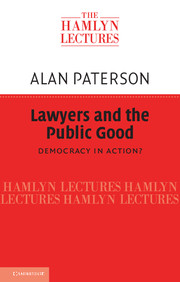Book contents
- Frontmatter
- Contents
- Tables
- Illustrations
- THE HAMLYN TRUST
- The Hamlyn Lectures
- Acknowledgements
- 1 Introduction: determining the public good
- 2 Professionalism re-assessed: what now for lawyers?
- 3 Access to justice: whither legal aid?
- 4 Judges and the public good: reflections on the last Law Lords
- 5 Conclusion
- BIBLIOGRAPHY
- Index
5 - Conclusion
where next?
Published online by Cambridge University Press: 05 June 2012
- Frontmatter
- Contents
- Tables
- Illustrations
- THE HAMLYN TRUST
- The Hamlyn Lectures
- Acknowledgements
- 1 Introduction: determining the public good
- 2 Professionalism re-assessed: what now for lawyers?
- 3 Access to justice: whither legal aid?
- 4 Judges and the public good: reflections on the last Law Lords
- 5 Conclusion
- BIBLIOGRAPHY
- Index
Summary
In the earlier chapters I have argued that the public interest in relation to three key institutions in a democracy– lawyers, access to justice and the judiciary– is now a matter that is too important to be left to lawyers and judges alone to determine. Without doubt, dialogues with non-lawyer stakeholders are becoming more prevalent with respect to these institutions, and these stakeholders are increasingly making their voices heard wherever such determinations are being made.
As we have seen, the very concept of professionalism for lawyers has been re-negotiated over the last thirty years between the state, regulators and consumer bodies, on the one hand, and the profession, on the other, in order to redress a perceived failure to achieve a balance between professional obligations and professional benefits that was in the public interest. These dialogues have been particularly active in relation to the elements of market control, public protection and autonomy. For the first, consumer pressure (allied to that from the Office of Fair Trading and, more recently, the Legal Services Board) is introducing ever more competition– with ABS being but the latest exemplar. As for public protection and autonomy, the dialogues with government, regulators and consumers have convinced the professional bodies that there must be a significant lay participation at all stages in the complaints process, from the new single gateways for complaints, to the panels of the disciplinary tribunals. Both in England and Scotland non-lawyers have begun to input to the drafting of new professional standards of conduct and service. Further, the movement away from self-regulation has led to lay stakeholders being on almost all regulatory bodies in connection with the legal profession in the United Kingdom, with a view to ensuring that the profession does not lose sight of the public good.
- Type
- Chapter
- Information
- Lawyers and the Public GoodDemocracy in Action?, pp. 194 - 197Publisher: Cambridge University PressPrint publication year: 2011

